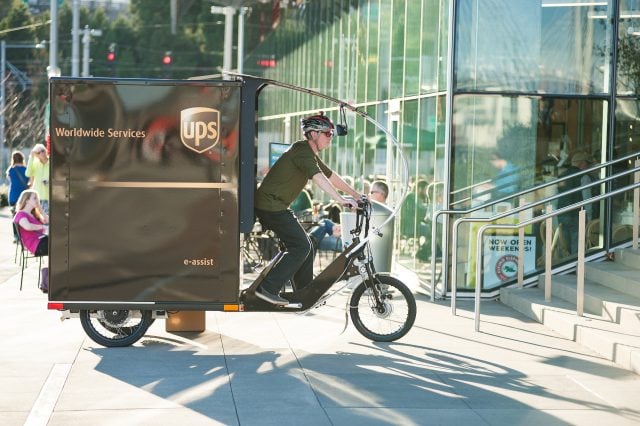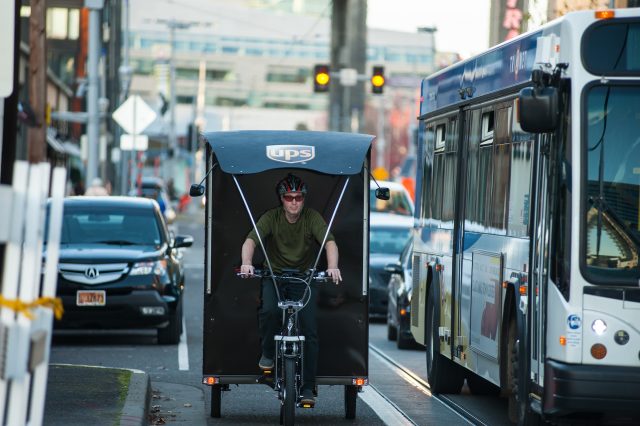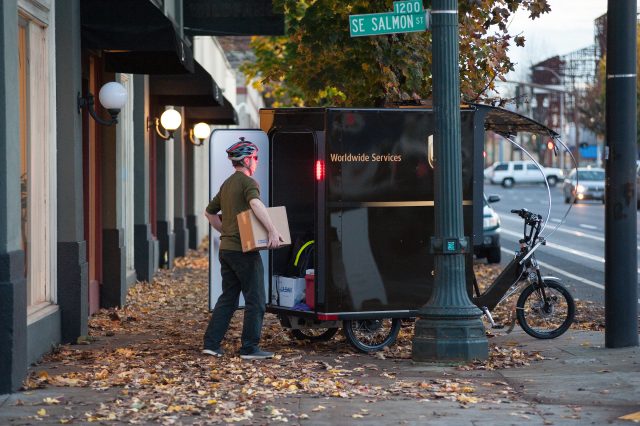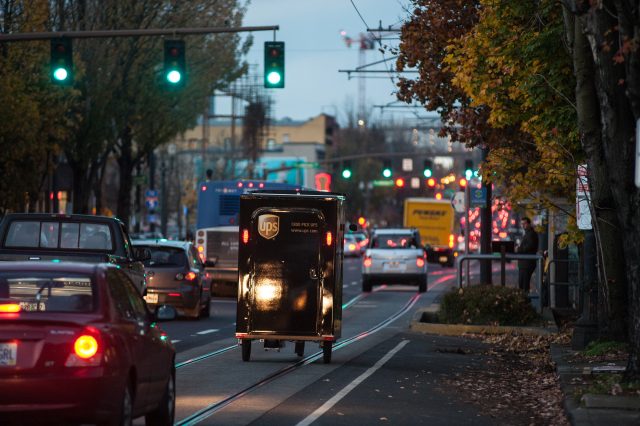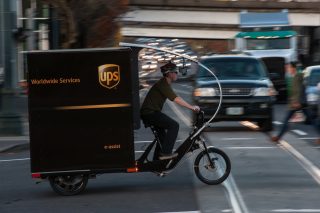
(Photos by Mark Gamba for Truck Trike)
Global package delivery juggernaut UPS has chosen Portland to debut its first electric-assist trike in the U.S.
In a statement released today, UPS said, “The deployment of the eBike is part of UPS’s ongoing commitment to reduce carbon emissions as city populations and e-commerce grow, and traffic, noise and air quality challenges continue to rise.”
Using trikes and other small, pedal-powered vehicles to deliver cargo in dense urban areas is relatively common in Europe. The European Cyclists’ Federation (an EU-funded non-profit) says 25 percent of all goods could potentially be delivered bicycles. That number rises to 50 percent when just considering lightweight cargo.
“The bicycle may be making a comeback as we navigate through crowded urban areas and continue our focus on environmental sustainability.”
— Mark Wallace, UPS senior VP
The trike being used by UPS was made locally by cargo bike innovator Bill Stites. It’s a custom version of his Truck Trike, a vehicle we predicted back in 2010 would change the shape of urban cargo delivery in cities across the globe. The Truck Trike can carry over 600 pounds of cargo plus 200 pounds of driver.
UPS started testing pedal-powered delivery vehicles in Germany in 2012. In that successful pilot, the company used a hub-and-spoke method to optimize efficiency. They placed storage containers in central locations and then had employees pick up packages by food or bike for final delivery. This type of urban freight delivery reduces emissions and congestion. It’s also similar to the concept already in use by B-Line. Last year they became the anchor tenant in a major food hub that distributes local food on the central eastside.
In their statement today UPS said Portland was a “logical choice” for the first U.S. deployment of an e-bike. As far back as 2008 the company has used traditional bicycles to handle deliveries during the busy holiday season. In 2011 they held a job fair in Portland and hired nearly 50 temporary bike delivery employees.
Advertisement
UPS Senior VP of Global Engineering and Sustainability Mark Wallace said using pedal-power gets back to his company’s roots. They started 109 years ago as a bike messenger company. “While we have evolved and developed a vast network of ground and air vehicles,” Wallace said, “the bicycle may be making a comeback as we navigate through crowded urban areas and continue our focus on environmental sustainability.”
UPS’s new trike will share the bike lanes with existing local pedal-powered freight delivery companies like B-Line Sustainable Urban Delivery and Portland Pedal Power — two businesses with successful track records.
While congestion and air quality are definitely important, road safety is perhaps the most exciting benefit of having smaller, lighter and slower delivery vehicles. As we shared a few months ago, these trikes take the place of much larger trucks and other motor vehicles on busy city streets. They can also park on wide sidewalks, which means fewer trucks double-parked in bike lanes and more loading zones left open for others.
B-Line Owner and CEO Franklin Jones said in an interview this morning that cargo trikes are very safe. “It’s a total win for the Vision Zero concept… The worst thing our trikes have ever done is taken out someone’s mirror.”
A trike will also likely save UPS money in parking tickets. A 2006 study (PDF) in Canada found that three delivery companies (including UPS) were issued 34,000 parking tickets in just one year that amounted to about $1.5 million in fines.
Jones, who has been in business since 2009, said he’s excited to see UPS enter the fray. “This is a good thing for us all. It’s a rising tide.” Jones says using trikes is far from simply a photo-op for sustainability. His business is strong and has grown each year. B-Line currently has eight cargo trikes in full-time use and six more are on the way.
UPS says if their Portland pilot is successful they will consider adding more bikes to the fleet next year. It’s unclear whether they’d continue to use the locally-made Truck Trike or if they’d buy trikes from another vendor.
— Jonathan Maus, (503) 706-8804 – jonathan@bikeportland.org
BikePortland is supported by the community (that means you!). Please become a subscriber or make a donation today.


